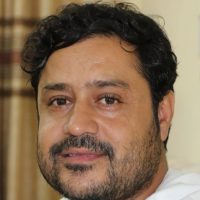Mohammad Ilyas Dayee, an Afghan journalist working for RFE/RL, was killed in a targeted bomb attack in Lashkar Gah, the capital of Afghanistan’s southern Helmand Province, on November 12. His younger brother, a former reporter for Deutsche Welle, was also injured in the attack.
Dayee, 33, was a victim of mounting violence in Afghanistan, where former and current journalists are being targeted with magnetic bombs.
Dayee reported on all aspects of life in Helmand. The region, Afghanistan’s largest province, represents an intersection of both the country’s rich cultural heritage and the security problems facing it today. Roughly the size of Switzerland and bordering Pakistan, Helmand is located in close proximity to Iran and is known as the world’s hotbed of poppy cultivation and illicit drug production.
“For the past 12 years, I have worked closely with Dayee as he tirelessly reported on the ongoing fighting with the Taliban, the militant group’s battle for control of key districts in Helmand, and the Afghan forces’ counterattacks. He constantly braved great dangers in bringing reportage from frontlines around Helmand.”
Abubakar Siddique,
Editor of RFE/RL’s Gandhara website
Dayee joined RFE/RL in 2008 and showed great dedication to his work. His reporting not only covered the dangerous security situation in Helmand, where the Taliban and government forces are in near-constant battle; it focused on how that impacted the lives of civilians in the province, which borders Pakistan and is close to Iran.
He was also keen to cover social and cultural issues and gave Radio Free Afghanistan some of its most incisive reports on the drug trade. Most of the world’s illicit opium is grown in Helmand before being processed into heroin.
He spent his childhood in a Helmand controlled by the Taliban. During his studies at university, he became a journalist in 2006 and reported for Afghan state TV, the Institute of War and Peace Reporting, and Salam Watandar, a journalist-training nonprofit and U.S.-funded radio station in Afghanistan.
Dayee’s killing has been widely condemned in Afghanistan, where no one has yet claimed credit for the attack. However, Kabul has hardly punished any of those responsible for the more than 50 journalists killed in Afghanistan since 1992, according to the Committee to Protect Journalists.
Dayee is survived by his wife and 1.5-year-old daughter, whom they named Mehrabani, which is Pashto for kindness.

